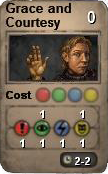



Basically, you will evaluate the situation in order to determine the topic, orientation, or matter of the discussion, and to prefigure the arguments you will use.
Technically, an evaluation will give you the precious expression points you need to build your assertions.
An evaluation is generally but not always balanced, it may fuel your opponent with the same expression as yours, or with another type of expression, it may give influence to your opponent on the dialogue, it may also exceptionally cost some basic expression in order to play it.
These evaluations are exclusive and will give you points in one single type of expression.
They are blatantly essential in strategies relying on a particular expression.
These ones are the weakest evaluations, and give only one point of expression, but they can be played once in two turns, which makes them the fastest type of statement.
As far as we can say, only NPCs have access to them.
Each one of those is bound to frivolity or lightness, which is the spirit of this statement.




These evaluations are the most common ones, as they are learnt during the basic training of each diplomat.
Although, some of them may be learnt exceptionally by other means, and other ones can not be learnt.
They all give two points of expression and are balanced either by giving one point or two points to the opponent or by taking away one point of influence on the dialogue; exceptionally, it may be unbalanced.
These ones give two points and one point to the opponent in the same expression, giving the diplomat using them a light advantage in this particular expression.
A diplomat learns only one of these four during basic diplomacy training based on his or her race.




These ones give two points and nothing to the opponent but take away one point of influence on the dialogue, in favour of the opponent.
A diplomat learns only one of these four during basic diplomacy training based on his or her race.




These ones give two points and two points to the opponent: one in the same expression than yours, and one in an opposite expression, except for Extol Virtues, which gives points to the opponent in the two opposite expressions.
A diplomat learns one of these during advanced training, and, some of these statements may be learnt exceptionally by other means.

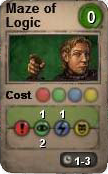


This is a class of special evaluations which give nothing to opponent.
The only one known is a camel specific statement. In fact, it could be proper to any animal which is smart enough to listen to your words given you have empathy for animals , but wild enough to not know the benefits of a bath or shower.

These are advanced evaluations, as they give no less than three points of expression, which allows to feed instantly more powerful assertions.
They are generally reserved to NPCs, but some of them may be learnt by a diplomat.
These ones are the most useful, as they give nothing to the opponent, but, like other strong evaluations, they can not be played very often.
Expert Analysis and Deliberate Flourish are available to diplomats.
The strength of these evaluations is well figured with the use of strong concepts (expert, deliberate) and authoritative forms (get results).


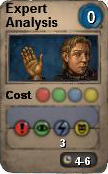

These evaluations may be disconcerting if not well looked at.
They seem to give four points of expression (which would be very strong), but give in fact three points, because they need one point to be spent in order to play them, which is an exception to the evaluation mechanism!
Note also that they have a longer refresh timer, making them less interesting than the unbalanced strong evaluations.
As far as we can say, only Trusted Sources had been available to diplomats, by way of an old writ reward, but the reward has been removed, whilst the diplomats who have learnt it did not lose its knowledge.


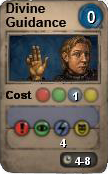

This one seems to be an exceptional statement used by some inspiring NPCs, and looks exactly like the unbalanced strong evaluations, except for the one point it gives to the opponent.

This one seems to be an exceptional statement and reserved to NPCs, too; has a very interesting refresh timer (usable once per two or three turns!) but at the cost of one influence point in favour of the opponent.
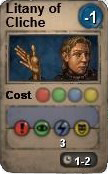
These evaluations could be called super-evaluations, as long as they give four points of the same expression, which allows to feed directly some very powerful assertions (those with five influence), or helps in conjunction with other expression fueling means to play the most powerful assertions ever (six to eight influence).
These ones are rare, and only used by relatively strong NPCs.
These two are the most powerful evaluations, as they give nothing to the opponent, but they have a huge refresh timer.
It seems that this type of evaluation is only practicable with some reasoning.


These two are a little less powerful than the previous ones, as they give two points to the opponent, but they have a reduced refresh timer.
It seems that this type of evaluation is bound to demand.


Many interesting and efficient strategies rely on several different types of expression; the use of two complementary expressions may give some additional strength to your statements; and a good diplomat should be able to adapt himself to any situation, so, should not be bound to a single expression.
From these points, we can say that the diplomats may have some use from evaluations which give two complementary types of expression.
These ones are the most basic blended evaluations, and give one point in a main expression, and one point in the complementary expression.
Given there are only four expressions, and given some basic use of mathematics, we can quickly see that there are only two real pairs of expressions in this set (1 demand + 1 inspire / 1 reason + 1 flattery), but each expression has its own statement.
They may be learnt by diplomats, with some travels and diplomacy works.
Like the single basic evaluations, the names are suggestive and mostly tied to simpleness.




These evaluations are very interesting, as they give two points in a main expression and one point in the complementary expression, which allows to play directly some main expression assertion, and helps to fuel other statements from the complementary one.
These ones are the standard blended evaluations, and are balanced in the fact that they give one point to the opponent (in the main expression).
Only one of these four is learnt by each diplomat during advanced training, and they can not be learnt by other means.

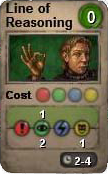


This one seems a little odd, as it gives four points to the opponent, thus giving him or her more expression than it gives to the speaker of the statement, but, as a counterpart, it gives one point of influence on the dialogue, which makes it look like an evaluative comment.
It is only used by NPCs.

This one is a special NPC-only evaluation, too, and the most powerful one, as it gives nothing to opponent.

These evaluations are nearly similar to blended ones, as they give two types of expression, but they not always give points in two complementary expressions, and they are specifically bound to NPC stations, so, they are not available to diplomats.
Indeed, each important station (social position, function or job) of NPC has its own evaluation, based on its preferred expression. (There seems to be an error or exception with the outsiders, which prefer flattery, whereas the outsider evaluation is based on demand.)
Each evaluation gives two points in the main expression, two points in another expression, and half of all that to the opponent, making it a really strong blended evaluation.










These ones may be very powerful evaluations, as they give three different types of expression, thus allowing to feed directly some powerful multi-expression assertions.
The only two known at this time give reason, inspire and flattery, so they both allow to play Disillusion right after playing the evaluation.
Only Scattered Impressions is available to diplomats.


Finally, these evaluations may be the most powerful ones, as they give all four types of expression, allowing to feed directly any multi-expression assertion.
But, as a counterpart, they are not accessible to diplomats (Broad Understanding), or only during a specific quest (Divine Radiance, which is a dwarven statement), or only with a civic lever buff (Grace and Courtesy, obtained with noble gossip).


